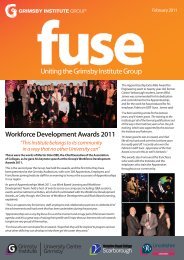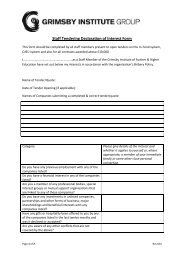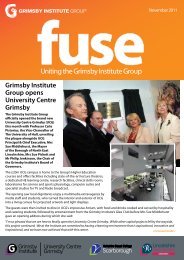Journal of Research & Scholarly Output 2006 - Grimsby Institute of ...
Journal of Research & Scholarly Output 2006 - Grimsby Institute of ...
Journal of Research & Scholarly Output 2006 - Grimsby Institute of ...
Create successful ePaper yourself
Turn your PDF publications into a flip-book with our unique Google optimized e-Paper software.
institutions and culture is circular; they<br />
cannot be separated”.<br />
Societal culture is a significant theoretical<br />
construct. Moloi (2003) refers to culture at<br />
three levels - surface, middle and deep. In<br />
her opinion, it is the deep culture i.e. the<br />
culture that develops through the language<br />
and life <strong>of</strong> the people, informed by time,<br />
traditions and history, that is difficult to<br />
change. Moloi (ibid) contends<br />
“that insufficient attention to the local culture<br />
results in only shallow surface comparison”.<br />
Within this concept <strong>of</strong> deep culture it is<br />
prudent to question whether the Chinese<br />
‘thousand mile horse’ lack <strong>of</strong> abstract type<br />
<strong>of</strong> thinking still prevails and consider the<br />
impact would it have on learning transfer.<br />
The exploration by Morgan (1986) <strong>of</strong> the<br />
concept <strong>of</strong> psychic prisons by using the<br />
allegory <strong>of</strong> Plato’s cave, suggests “People<br />
can get trapped by illusions hence the way<br />
they understand reality is limited and<br />
flawed”. Whilst Fink, (2001) observes:<br />
“we get caught up in ones own mindset that<br />
we become unwilling or unable to see the<br />
perspective <strong>of</strong> others”.<br />
Consequently we could reject alternative<br />
viewpoints because they do not sit<br />
comfortably within our paradigm.<br />
Lumby, J. (2004) argues<br />
“an international perspective consequently<br />
leads to a critical attitude <strong>of</strong> existing theory<br />
which is based largely on western values<br />
and also <strong>of</strong> the dominant group within the<br />
west – white middle class men”.<br />
The point that Lumby makes is crucial as it<br />
encourages reflection on the influence <strong>of</strong><br />
personal values. We <strong>of</strong>ten develop ideas<br />
about other people’s values by observing<br />
their behaviour, rather than through detailed<br />
discussion. Such observations may well be<br />
biased towards the support or confirmation<br />
<strong>of</strong> the personal values and viewpoints that<br />
we already hold. It is important that we<br />
acknowledge what may be accepted as fact<br />
or truth in one culture may not be in another.<br />
The denial <strong>of</strong> the existence <strong>of</strong> Nepal as a<br />
country previously referred to emphasises<br />
this point. Developing the ability to see<br />
things from a different perspective from<br />
other parts <strong>of</strong> the world is needed to change<br />
our embedded thinking to ensure the<br />
successful transfer <strong>of</strong> learning to an<br />
international student cohort. Lumby (2004)<br />
provides a useful definition:<br />
“An international perspective can therefore<br />
be defined as viewing values and practices<br />
in locations across the world including one’s<br />
own with sufficient openness to reach<br />
insights about similarities, differences and<br />
their scale and translating such insights into<br />
renewed commitment and ideas for<br />
developing one’s own practice. Such a<br />
stance <strong>of</strong>fers vibrant learning to leaders (and<br />
educators) wherever they are based”.<br />
Within the framework <strong>of</strong> indicative content<br />
and learning outcomes, educational<br />
programme planning in the UK is quite<br />
straight forward – define what the students<br />
must learn, divide the learning into<br />
convenient chunks, produce schemes <strong>of</strong><br />
work and lesson plans, establish<br />
timeframes, develop an assessment/ testing<br />
regime, organise learning resources, then<br />
tell the teachers how to achieve<br />
predetermined targets. The Higher<br />
Education programmes for delivery at<br />
<strong>Grimsby</strong> <strong>Institute</strong> <strong>of</strong> Further and Higher<br />
Education are planned and organised in<br />
Page 26<br />
FOCUS

















